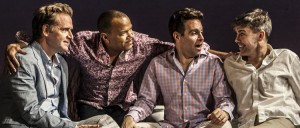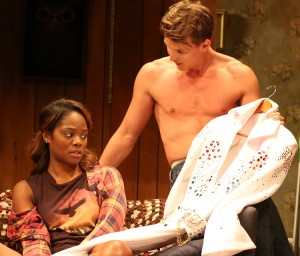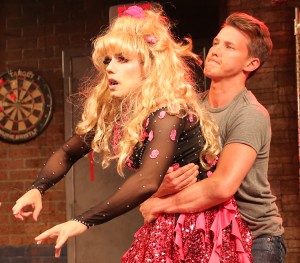Jody and Carl, the only characters in Lonely Planet, are habitués of a sleepy little shop called Jody’s Maps in an unnamed American city. These middle-aged men, intricately rendered in Steven Dietz’s subtle, elegiac script, are being realized vividly by New York stage veterans Arnie Burton and Matt McGrath in a Keen Company production celebrating the 25th anniversary of the play’s premiere at Northlight Theatre in Evanston, Ill. Lonely Planet, winner of the PEN Center USA Award for Drama, was written when the arts were being defoliated by an epidemic beyond the American medical community’s control. AIDS is the background of the play, but not its subject.
Gay Rites Now
Steve, the ambitious new play by Mark Gerrard being presented by The New Group, belongs to a particular subset of gay theater that focuses exclusively on a group of homosexuals. The prototype, Mart Crowley’s The Boys in the Band (1968), reflected the self-loathing of its closeted characters, leavened with bitchy humor. (Its one ostensibly “straight” character may have been bisexual.) Later examples—Kevin Elyot’s My Night with Reg and Terrence McNally’s Love! Valour! Compassion! (both 1994); Peter Gill’s Certain Young Men (1999); and Chuck Ranberg’s End of the World Party (2000)—charted the difficulty of living in the age of AIDS and celebrated the nuclear families that gay people assembled to replace marriage or because of rejection by relatives.
Gerrard’s play may be one of the first in the genre in which matrimony is no longer off the table. Apart from that milestone, however, the interests of its characters are mundane: the exhaustion of parenting, the temptations and repercussions of adultery, and alienation by digital communication. The specter of death is present, but in the form of Ashlie Atkinson’s lesbian buddy Carrie. Dying of cancer, she is one of two best friends to Matt McGrath’s Steven, often called Steve.
Steve’s other best bud is Matt (Mario Cantone), wed to Brian (Jerry Dixon). Steve focuses on the two sets of middle-aged partners navigating the new marital landscape. Steven is 47 and married to Stephen (Malcolm Gets); they have an 8-year-old son, Zack. Matt and Brian are childless. Providing complications are two other characters: Steve, a personal trainer who is never seen, and Esteban, a fetching young Argentinean waiter/dancer (Francisco Pryor Garat) whose path continually crosses Steven’s, until the inevitable occurs. If the conceit of the names is meant to signal that all gay men face fundamentally the same issues, the device comes off as excessively precious.
First among equals is McGrath’s character, and his decency is established by the way he helps the ailing Carrie. Even with the most sallow-faced crankiness, McGrath delivers warmth and a wry wit. Recalling a trip to the beach, he says, “I thought we were all at the beach having a great time… Four middle-aged men, and our occasional lady visitor, desperately interested in the slightest recognition that we’re still sexually desirable to the sexually desirable—or even to the almost-sexually desirable—secretly afraid that we’re not, but bravely clinging to the illusion—and each other—like a jaunty, gay Raft of the Medusa.”
But Steven has learned that Stephen is having an affair with Brian. Under Cynthia Nixon’s direction, we see it conducted through ribald sexting, shown on an upstage wall by Olivia Sebesky’s projections. Steven shields Matt from the truth, even after he learns that Brian has invited trainer Steve to move in, and with Matt, become a threesome. Moreover, that arrangement has been made possible by Steven’s taking in Carrie, grown sicker with her cancer and needing a place to stay. Feeling unappreciated and betrayed by Stephen, Steven pursues Esteban. It’s all fundamentally The Seven Year Itch, but multiplied and with twists.
One problem is that one never sees the relationship Stephen and Steven have before Steven’s discovery of incriminating evidence (which he keeps to himself), so the stakes are unclear. And Gets and McGrath have scant chemistry; they’re at odds from the first, and the former has a thankless part, frequently tapping on a cellphone in his hand as the audience reads the projections.
Nixon tries to lighten the tone using Broadway show music during scene changes (and in a prelude of roughly 20 minutes, when the cast stands around an upright and sings). And Gerrard ladles on musical-theater in-jokes relentlessly. Steve laments, “What kind of God would allow the movie version of Mame?” Matt talks about his upcoming three-way: “We’re excited. Excited and scared”—one of many direct references to Stephen Sondheim. Indeed, Steve’s drink of choice is a vodka stinger.
The unsettled tone may reflect the honest bewilderment of where gay life goes from here, but it looks only marginally different from what any relationship faces, except for the issue of sex. In a piquant but fleeting moment, Gerrard suggests that fidelity is an overrated construct. As Brian boasts to the group in the climactic scene: “I came this close to making out with the most beautiful boy in the kitchen who turned out to be the most beautiful girl. And maybe we made out a little anyway.”
The New Group presents Steve at the Pershing Square Signature Center (480 West 42nd St. between 9th and 10th Aves.) in Manhattan through Dec. 27. Evening performances are at 7:30 p.m. on Tuesday-Friday and 8 p.m. on Saturday; matinees are at 2 p.m. on Saturday and Sunday, with special matinees on Dec. 16 and 23. For tickets, visit www.thenewgroup.org.
Dressed to Cross
Matthew Lopez, best known for The Whipping Boy, an intense drama about slavery and the Civil War, could hardly have followed it with something more different than The Legend of Georgia McBride, a confection of spangles and sass at the Lucille Lortel Theatre. The new play is a farce in the vein of La Cage aux Folles and Tootsie, leavened with some obvious sermonizing about finding one’s inner self and celebrating the indomitability required to wear a dress and padding—sort of “Climb ev’ry mountain, find ev’ry frock.” It’s good fun, and there are plenty of laughs, but it’s also predictable. Uptown, for instance, an empowered drag queen saves a whole factory full of straight people by manufacturing irrepressible footwear.
Skillfully structured by Lopez, and well-directed by Mike Donahue for MCC Theater, Georgia McBride follows a young married man, Casey (Dave Thomas Brown), who can’t manage to support his wife, Jo (Afton Williamson), by performing as Elvis. When they’re about to be evicted from their home because they’re behind on their rent, and Jo is pregnant, the irresponsible Casey reassures Jo with “We’ll figure it out."
Under Tracy’s tutelage, Georgia starts as an ugly duckling but becomes a star. In typical farce fashion, however, Casey doesn’t tell his Jo what he’s up to. He just hands her the increased income and explains that bookings of heavy metal bands have increased profits at the bar, which is 40 miles from their home. Eventually, of course, Jo finds out everything, and there’s some dramatic hand-wringing about whether she will leave him, but none of it rings true, and Williamson in the thankless role can’t do much to invest it with suspense.
The cast is mostly outstanding. Nobbs plays two roles, and as Rexy he’s not really convincing as a woman, unless you think “roller derby.” (The idea that Rexy could pull off Piaf is ludicrous.) But as Casey’s henpecked neighbor Jason, the actor shows why he’s one of his generation’s outstanding artists. A highlight of the production is Jason’s recollection of his dating “a gender nonconformist” that Nobbs imbues with nostalgia, rue and gentle humor.
McGrath as Tracy has the showiest role, and he seizes it with relish, by turns sympathetic, caustic, disdainful, but most often indomitable. He has the fun of dropping most of the inside references: to Stephen Sondheim (Company, Sweeney Todd and West Side Story), What Ever Happened to Baby Jane?, and Auntie Mame, among many others.
Anita Yavich supplies all the explosions of color one expects from drag costumes—and there are plenty of them—and Ben Stanton’s lighting is sometimes subdued, sometimes garish, and always fun. Donyale Werle has contributed a set that screams “sleazy white trash.” (It’s a stereotype that Lopez indulges in as well, when Jason speaks of his wife and children: “There were rumors we had some cousins in common, and now I think that might have been true.”)
All in all, The Legend of Georgia McBride covers well-tilled ground, but has enough wit and wisdom of its own to make a visit pleasurable.
The MCC Theater production of The Legend of Georgia McBride runs at the Lucille Lortel Theatre (121 Christopher St. between Bleecker and Hudson Sts.) in Manhattan through Oct. 11. Evening performances are at 7 p.m. on Tuesday and Wednesday, and 8 p.m. on Friday and Saturday, with Thursday evening performances at 7 p.m. on Oct. 1, and at 8 p.m. on Sept. 24 and Oct. 8. Tickets may be purchased by calling 212-727-7722 or visiting www.mcctheater.org.










